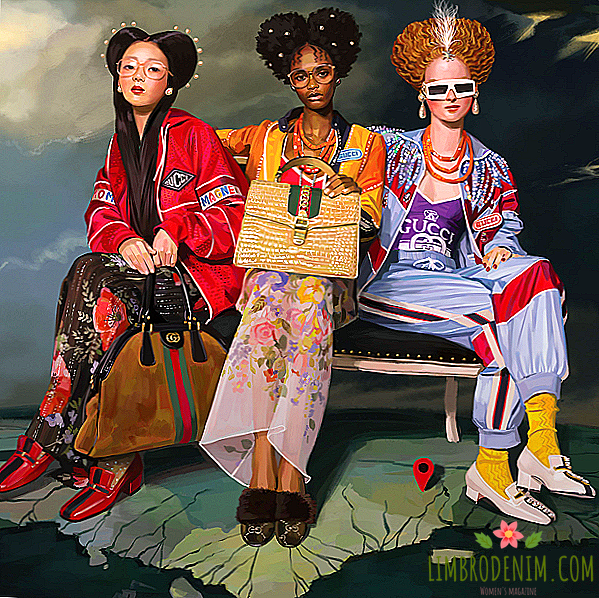Bookshelf: Sociologist Ella Paney about favorite books
IN BACKGROUND "BOOK SHELF" we ask heroines about their literary preferences and editions, which occupy an important place in the bookcase. Today, sociologist and publicist Ella Panei talks about favorite books.
INTERVIEW: Alice Taiga
PHOTO: Alexander Karnyukhin
MAKEUP: Elena Kazantseva

Ella Paneyah
Sociologist and publicist
I am probably one of the few freaks who reread the complete works of Balzac
 I read all my childhood and, one might say, I didn’t do anything else as a child. I just sat there and read until I started some kind of life besides reading. Perestroika began - in 1986 I was sixteen years old. And I quickly found myself informal parties in which you could already live, and not hide in books.
I read all my childhood and, one might say, I didn’t do anything else as a child. I just sat there and read until I started some kind of life besides reading. Perestroika began - in 1986 I was sixteen years old. And I quickly found myself informal parties in which you could already live, and not hide in books.
But oddly enough, all the parties also ended with books. At first I contacted the Jewish party and found myself sorting out and organizing its library: I worked a little bit in the library of the Academy of Sciences at the age of seventeen and knew how to do it, how the ciphers and everything else were put. Then I joined the Democratic Union party and rather quickly found myself a breeding book there. We with the older comrade who taught me this, just covered the window in the kitchen with the blanket for the night and printed: instead of the usual light bulb, the red was screwed in and further on an industrial scale leaflets were made for the then-rallies or samizdat books. In particular, we managed to reprint the GULAG Archipelago several times completely with a photo-method - just a month before it was published in a magazine version, it was very offensive.
Apparently, I was born a sociologist, but since the social sciences in the Soviet Union were in a very large corral, for the time being it was necessary to be content with other sources of knowledge about how relationships between people are arranged. I re-read the entire Russian and French XIX century, which was accessible enough, and already appeared books of psychologists and literary critics, which in fact were about society. I am probably one of the few freaks who reread the complete works of Balzac. As a standard, I read Russian classics, and then literary texts, which explained something about social relations between people. Maybe not everyone will agree with me, but I think that all of our intimate acquaintance with the life of Pushkin’s circle and the golden age of Russian poetry is really not at all about how real life has historically been arranged. It was a pretext for talking about the present in an allegorical language, an attempt by the Soviet intelligentsia to explain among themselves how they themselves could live in their epoch.
For many years I have been studying the state: I look at how it is arranged in its different parts, I study state organizations and the legal field. Many structures that come across to me as a researcher in practice are rooted, old, and many, on the contrary, have been constructed quite recently - and it seems to us that there can be no other way. Reading books from the list below led me to believe that it is necessary to figure out which of the properties of the state that we consider natural, historically old and the same everywhere, and which will collapse when a certain historical period passes. This is what I'm digging right now.
For many years I have been studying the state: I look at how it works in its different parts
Irving Hoffman
"Introducing yourself to others"
My first real sociological book came into my hands when I was an adult - and I was very lucky with it. This is really a classic, basic, defining text for sociology of the 20th century. He was in my hands as soon as he came out - and I realized that I really want to know about the world around me. I’m not interested in Natasha Rostova’s thoughts, but I’m interested in the basic micro-components of what makes up society, how people make something more or less unified and predictable. Hoffman is also beautiful because in addition to being a great sociologist, he also writes very funny.
Michel Foucault
"Oversee and Punish"
In the early 1990s, they began to print a lot of books that explain about society and about people in plain English: the language of science, rather than artistic metaphors. The second sociological book that really influenced me a lot is Michel Foucault, “Supervise and Punish”, also read in his student years. At that time, no one had a systematic education in the Western social sciences, so I did not understand which tradition is part of Foucault. But at the same time, he completely broke the pattern - it was a fundamentally new way for me to talk about the structures of power and how people influence each other in modern society.
After “Supervise and punish” you begin to feel how modern a person is not free without noticing it: the structures of power in society are arranged so that a person does not notice them. Yes, it is not direct violence, it is not a policeman with a pistol who forces you to do something with force. It's all the time if you yourself want everything that you do not in your favor, as if you yourself are watching so that God forbid you not disrupt public order and the existing hierarchy. And in fact, this is all - guards who are hooked into your head. And the structures that add current supervisors to your head have not always existed: they were created, constructed - partially consciously - by people who knew what they were doing.
My belief is that you understand, can not frighten. And these structures, because they are soft, are very vulnerable to understanding. Of course, I exaggerate a little when I talk about fear and understanding. If you understand how a nuclear bomb works, it may be even more scary for you. But when you understand how the structures that make you refuse to attend the party are arranged, if you do not have time to put on your makeup and hair, then you stop refusing to attend the party for this reason - and the power structures pass by you through the forest. In the modern world, violence is more often arranged not as a bomb, but as a set of psychological structures-manipulations by others. Their belief is that there can be no other way, and in their right to control others. And your conviction is the same. These beliefs are afraid of the light, afraid of dubbing, and even a tacit understanding of what is happening allows us to become much more independent of them.
Charles Tilly
"Coercion, capital and European states"
The book of the times of my sociological education - I met her at the University of Michigan. There I took the course of Russian history: I was fond of history and thought that I knew her well, at least the history of my country. And this, of course, was a completely different look.
Tilly takes the concept of a stationary gangster, borrowed from Mansur Olson, and builds a model of the origin of the European state, which begins with the fact that a gangster comes to earth - as Rurik came to us according to legend. Then, of course, a legend was created that they called him, but in general just a wandering head of the gang came and sat down on the ground. And then everything depends on whether he needs this land, whether he has opportunities for unlimited expansion, whether he needs the population to develop further, or whether he can continue to live by seizing new lands. The European states, since they very quickly captured the whole territory, were different in that every gangster on the border had the same gangster - and they had to develop their territory and enter into contact with the population.
Russia appears in this book as an example of the opposite situation - a state that does not need a base to its population, besides pushing away from it and continuing its expansion. Now, after reading modern books on Russian history, I understand that this is a highly exaggerated view, but the current books did not exist then - this was my very first book on macrosociology.
Hernando de Soto
"The Mystery of Capital"
“The Mystery of Capital. Why capitalism triumphs in the West and is defeated in the rest of the world” —that is how it is called in Russian. This book was published in the mid-90s, it was very popular all over the world, but it thundered and went out, not becoming a great classic. De Soto - an economist from Peru, who was engaged in local reforms and wondered why capitalism does not work, and went to do field research.
De Soto and his assistants began to understand what prevents people from using their resources as capital — assets, resources, or money that can start working and help them out of poverty and start their own business. In the regions he studied, people have a lot of property, but there are no conditions for property to become capital, that is, it starts working. And he describes a very interesting situation: we are accustomed to thinking that if there is no law and order for everyone in the country, then most likely the situation will be such that the elites do what they want, and the people are forced to live by the laws that the elites wrote for him it was more convenient to exploit.
But De Soto describes the Latin American situation as completely opposite. Law and order is for elites. It is easy for you to register a company, if you have acquaintances, you will not be deceived, you will be given a loan, the police will protect you, your property will be protected by the state, you will be able to use the court if you have problems, and there is law and order for you. But it does not apply to everyone. And where there is a field of law and order, that is, where there are resources to use them - and there is normal capitalism. And all other people live outside it, outside this institutional framework.
Douglas North
"Violence and social order"
The late book of the late 2000s and for North, in my opinion, the last. She was very influential in Russia in the early tenths, she was read here instantly. It was a very new and fruitful frame for talking about how society is changing at the macro level. The concept of the idea of North is that order, rights and security arise when social groups appear that can demand them and, as they say, pay for them. Elite becomes a lot due to the division of labor, each elite controls its resource, has its own skills, without which you cannot get anywhere. The military can not do without scientists. Scientists can not do without financiers. Elites who cannot do without each other have to negotiate and arrange some kind of security space, recognition of mutual rights and mutual assistance. And then there is what North called the order of limited access (this is exactly what De Soto describes).
When you have unique resources, you have influence and you fall into the circle of full-fledged citizens who cannot be subjected to arbitrariness while they abide by conventions for which court, justice and the right to vote exist. If the development of society goes in the right direction, then access will expand. And at some point it becomes easier to stretch this umbrella at all than to maintain the barrier between the elite and the population. And, accordingly, the procedure of limited access is replaced by the order of full access, and all citizens of the country have the right to participate in decision-making, the right to security, protection by law, protection of property.
North's theory allows us to comprehend and see how institutions are stable, the rules of the game that people take for granted and not dispute how they are formed at the micro level. And to draw a bridge between everyday life and how large structures are formed. How, for example, business practices are formed. The interaction between business and government. How does the face of what political scientists call the political regime?
James scott
"Good intentions of the state"
In the original, this book is called "Seeing like a state" - if I translated this title, I would translate it as "From a state point of view." This book is about how, what great and monstrous social consequences occurred when a state of the modern era — large, territorial and aspiring to control all people and all resources, all aspects of life in a subject area — starts projects for the benefit of humanity.
Scott describes a dozen projects that the state tried to implement in the XVIII, XIX, XX centuries. Naturally, the most vivid examples are taken from some colonial stories, where the state comes to a population that is not very prepared for the fact that they will be rewritten, classified, and explained to them the new rules of the game. And Scott is studying the practice of resistance, because people oppose such streamlining, rationalization, interference in their daily lives. And they resist quite the same way, whether they are natives, to whom the colonialists arrived, or people whom they decided to do much good by building a properly built city of the future for them.
It works the same way in bureaucracy, I see it in my own research. The police, which are filled up with reports. Students driven into schedules and deadlines. Judges who have everything bureaucratic. Officials All develop practices that make them invisible for control systems. Nothing stands out - on the one hand, and on the other hand, impenetrable. "On paper, we are what you want, and what we really are, you will never see."
The description made by Scott is a very convenient tool for studying any sphere of modern life, because our state is comprehensive and total, it permeates society as a whole. An ordinary reader may be interested in a book simply because it is a dozen very fascinating stories about why big projects fail or are always carried out differently than on paper. As in the proverb - it was smooth on paper, but forgot about the ravines.
James scott
"Hidden Transcript",
"The Art of Unmanaged Life"
Scott has two more great books. One of them has not been translated, in my opinion, still into Russian and is called "Hidden Transcript" - about how people use language and stories to build for themselves the opportunity, if not to resist violence and exploitation, then in any case to preserve dignity and the existence of the meaning of life when they are subjected to dominance and dehumanize. And his later book, which everyone needs, is called “The Art of Unmanaged Life” - about the stateless areas that still remain in the world. It is very interesting.
The only drawback of this book is that it takes Zomia, an inaccessible mountain region in Southeast Asia, as an example of such a region, and, accordingly, the entire historical outline is drawn from the history of this region, which, for example, is completely unfamiliar to me. You read - and you don’t get any picture before your eyes, the names of historical figures he mentions say nothing about. If he wrote about Europe like this, it would be much more interesting to read.
Zygmunt Bauman
"Flowing Modernity"
The story of what is happening to us now. How the world of modernity is destroyed - rationalized, regulated, where the state is the main provider of institutions. Bauman explains that people have better ways to interact with each other and more advanced institutions. A modern example (the book itself was written earlier): a social network brings people better than a partnership for work or school. You select a better and more suitable environment for you personally and at the same time do not lose, by the way, those people with whom you were connected in the past stages of your life. Everyone has found those people who are suitable for intellectual exchange.
There is a problem, they started writing about it later: it leads to the formation of closed bubbles, where it seems to a person that the whole world is similar to him. But at the same time, everyone interacts with those who suit him better, the diversity of the environment for everyone is still growing rather than falling. And these connections are "cheaper" in terms of resources, faster, and they have less control over a person than in hierarchical old structures dependent on states, so they win. Hierarchies remain "for the poor and the backward", everyone who can, leave them where they can. Compare a video tutorial on the Internet and a formal education with a diploma - where do you quickly learn exactly what you need right now? This is a faster solution and newer institutions of "fluid modernity", which is inherited from the institutions of modernity - large hierarchical bureaucratic structures.
Jared diamond
"Guns, Microbes and Steel"
A terribly fascinating reading about how, from the point of view of Diamond, geography and nature predetermine everything - indeed, all the fates of human societies. The book, frankly, pseudoscientific, popular science. But it reads very exciting - you learn a lot of interesting things.
Alexander Markov
"The evolution of man"
This is a dilogy: "Monkeys, bones and genes", "Monkeys, neurons and soul". Книжная дилогия, которая читается как детектив, её вполне может прочесть человек без всякого биологического образования. Автор - выдающийся учёный сам по себе, но пишет для обычных людей о том, что существует нечто объективное, а не социально сконструированное, что действительно нас определяет. И биология связана с нашей социальностью совсем не так, как все думают.After reading Markov, you will never again say "in monkeys alpha males eat first, which means that we have alpha males should eat first" or "monkeys have polygamy, which means we should have polygamy." Everything is much more complicated - culture participated in evolution much earlier than evolution made man.




